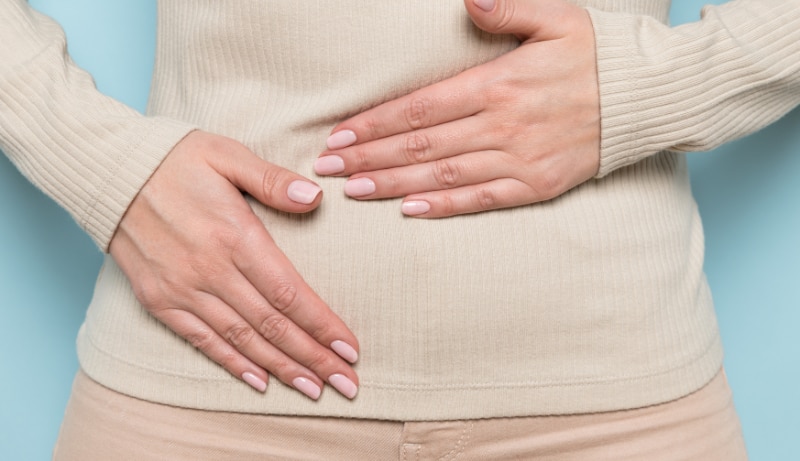10% off £30 OR 15% off £40
Are probiotics good for your stomach?

Summary
1The benefits of probiotics for your stomach
A lot of the health benefits linked to probiotics are believed to be a result of how they balance the level of 'good' and 'bad' bacteria.
2Probiotics for bloating
If you’ve landed on this page, you might already be dealing with stomach issues like bloating. You might also be looking for a way to manage it.
3Probiotics for constipation
So, can you take probiotics for constipation? Some studies suggest that it might be able to improve childhood constipation.
Gut health is gaining a lot of traction in the health and wellness industry – and for good reason. But where do probiotics play a part in this? Often taken as food supplements, probiotics are live bacteria and yeasts thought to support the natural balance of bacteria in the gut.1 If you’re interested in learning more about taking probiotics for gut health, you’re in the right place.
In this article, we’ll run through the different ways that probiotics can contribute to the health of your digestive system.
The benefits of probiotics for your stomach
A lot of the health benefits linked to probiotics are believed to be a result of how they balance the level of 'good' and 'bad' bacteria.2 An imbalance of gut bacteria has been linked to autoimmune issues, digestive problems, sleep issues, skin rashes, sugar cravings, tiredness, low mood, and weight changes.3
Also, some research suggests that probiotics may be able to support healthy weight loss. We’ve got the full lowdown on how they can help in our article: Can probiotics support weight loss?
Probiotics may also be able to help with:
- bloating
- diarrhoea
- constipation
We’ll dive into the science of how probiotics can support these areas of gut health below.


Probiotics for bloating
If you’ve landed on this page, you might already be dealing with stomach issues like bloating. You might also be looking for a way to manage it. So you’ll be pleased to hear that IBS-related bloating may be improved with probiotic supplements. When analysing 27 studies, 12 concluded that probiotics had a beneficial effect on bloating when compared to the placebo. Having said this, the other 15 studies reported no significant effects.4,5
Some of the specific strains of bacteria that were said to reduce bloating include:
- bifidobacterium lactis
- bacillus coagulans
- VSL#3
- B. infantis
It's also worth mentioning that other studies indicate that probiotics can increase bloating in some instances, so what works for you may be different for someone else.6
Probiotics for diarrhoea
In terms of taking probiotics for diarrhoea, the results of various different studies are promising, so we’ll explain them in a little more detail.
First up is how probiotics may be able to support antibiotic-associated diarrhoea (AAD).7 Since antibiotics can alter the microbial balance in the gut, it can cause diarrhoea in some people. A 2019 study found that probiotics have a moderate protective effect in preventing AAD and also reducing the duration of this kind of diarrhoea by one day.7
But it doesn’t just help AAD. Certain strains have been found to reduce the length of time you have diarrhoea for. One specific meta-analysis explored the effectiveness of probiotics on children with acute diarrhoea and found that they helped to reduce the duration, hospitalisation risk, and decrease the stool frequency.8
So, which are the best probiotics for diarrhoea? The types that are most often used to help with diarrhoea are Lactobacillus rhamnosus, Lactobacillus casei, and the yeast Saccharomyces boulardii.9,10
Probiotics for constipation
So, can you take probiotics for constipation? Some studies suggest that it might be able to improve childhood constipation.11 In fact, one study from 2014 found that probiotics had a positive effect on increasing stool frequency and improving consistency after a four-week trial.12
Another scientific review of six trials concluded that probiotics have the potential to increase stool frequency in children with constipation.11
But that’s not all. There’s also some evidence to suggest that probiotics can help to improve the symptoms of pregnancy-related constipation.13,14
How to take probiotics for your stomach
When it comes to taking any health supplements (probiotics included), you always have to follow the guidelines on the label.
Generally speaking, it's not recommended to take them with a hot drink as this can kill the bacteria before it even reaches your stomach.15 In terms of taking probiotics with a meal, the research is mixed.16
Bifidobacterium and Lactobacillus are said to have the best rates of survival when taken up to half an hour before a meal.16
Side effects
Fortunately, probiotics have been widely used for many years without many safety concerns. However, the effects of probiotics on people with a history of illness has been studied less, so needs further research. What we do know is that the risk of any potentially harmful effects of probiotics is greater in people with compromised immune systems or severe illnesses.17
Another reported side effect of probiotics is abdominal pain, so this is something to be aware of.18 You may initially experience some excess wind and bloating as this can happen while your body gets used to the probiotics.19
It goes without saying that it’s always best to check with your GP or a medical professional before trying any supplements like probiotics, as they can provide you with advice that’s specially tailored to your personal health situation.
The final say
If you’re interested in taking probiotics for IBS, they may be able to help with some of the symptoms that come with it like bloating, constipation, and diarrhoea. But it’s important to remember that not every study found that they had these benefits, so the effects may differ from person to person.
- https://www.nhs.uk/conditions/probiotics/
- https://pubmed.ncbi.nlm.nih.gov/28914794/
- https://www.piedmont.org/living-better/signs-of-poor-gut-health
- https://www.ncbi.nlm.nih.gov/pmc/articles/PMC4356930/
- https://www.ncbi.nlm.nih.gov/pmc/articles/PMC5900870/
- https://bmcgastroenterol.biomedcentral.com/articles/10.1186/s12876-016-0470-z
- https://pubmed.ncbi.nlm.nih.gov/31039287/
- https://pubmed.ncbi.nlm.nih.gov/31517810/
- https://www.ncbi.nlm.nih.gov/pubmed/22071814
- https://pubmed.ncbi.nlm.nih.gov/30586435/
- https://www.ncbi.nlm.nih.gov/pmc/articles/PMC5408016/
- https://www.ncbi.nlm.nih.gov/pubmed/24812563
- https://www.ncbi.nlm.nih.gov/pmc/articles/PMC5294450/
- https://www.ncbi.nlm.nih.gov/pmc/articles/PMC3502183/
- https://www.food.gov.uk/safety-hygiene/cooking-your-food
- https://www.ncbi.nlm.nih.gov/pubmed/22146689
- https://www.nccih.nih.gov/health/probiotics-what-you-need-to-know
- https://www.ncbi.nlm.nih.gov/pmc/articles/PMC6950558/
- https://www.ncbi.nlm.nih.gov/pubmed/20208051













